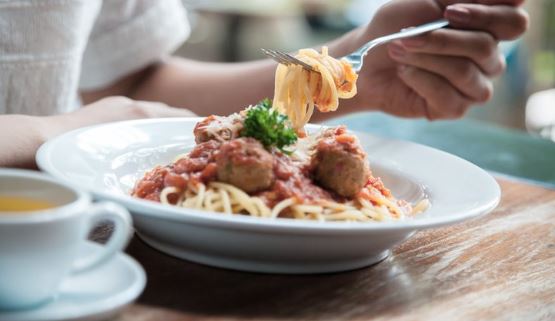“You can never be too rich or too thin” is a long-standing adage from a 1930’s Duchess. Our society has taken this stigmatizing quip one step further by adding “you can never be too busy.” We value productive people. We expect vendors and support people to respond to us on weekends. With smartphones in our pockets and purses, it is unthinkable to ignore work or phone messages in the evenings. We demand all things instantaneous.
How does this expectation translate to our nutrition and our health?
There has been a 33% drop in family dinners in the past 20 years. A 2019 study out of New York University’s Langone Health noted this drop in meals. Families are playing tag team to get to more and more school activities and sporting events, and work commitments aren’t 9 a.m. – 5 p.m. anymore. Even families that are able to sit down together only spend 15-30 minutes at a meal.
Generalized anxiety disorder now impacts 6.8 million adults in the United States according to the Anxiety &Depression Association of America. Women are twice as likely to be impacted by anxiety. The stress of daily life is a key factor leading to our physical disconnect. Because of this, we have lost our ability to feel hunger and enjoy the satisfaction of the meal itself.
During periods of stress, most of us push even harder instead of slowing down or adding time for self-care. This leads us to cope with our stress in unhealthy ways. Alcohol sales reached an 18 year high during COVID. Especially in the early months of the pandemic, some states saw a 20-40% increases in alcohol sales.
The more is better mentality also hit our desire to eat healthy. Our drive to decrease GMOs (genetically modified organisms,) provide organic options and grass-fed beef has manifested into a militant set of rules with shame associated in eating the “wrong” food. Talk about stress!
Let’s Be More Intuitive!
– Take steps towards mindful eating and bring satisfaction back to the table. Set an attractive table. Make the space stress free. Slow down and enjoy the taste of the food and notice when you are full.
– Prioritize movement to help you connect to your body and help to regulate stress. Movement doesn’t need to be a rigid exercise program. If you have been previously alienated by exercise, give yourself permission to move. How does it feel to stretch, walk, or be outside?
– Recognize and resist diet culture’s external rule for what you eat or how you eat. We are so accustomed to the daily presence of diet culture. With something as systemic as diet culture, let’s start with ourselves. Put into practice body appreciation. Instead of “My legs are so fat”, try ”My legs are strong and I’m grateful that I can move.”
– Kristen Bunich, MA RD LDN
Kristen is a non-diet Registered Dietitian and owner of The Intuitive Dietitian. Her passion is healing the relationship between food, image and self-care.




